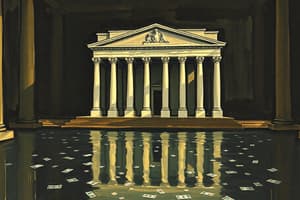Podcast
Questions and Answers
What is a key factor that affects the supply of money?
What is a key factor that affects the supply of money?
- Inflation rate
- Changes in reserve requirements (correct)
- Increased government spending
- Fluctuations in international trade
What is the purpose of the money multiplier?
What is the purpose of the money multiplier?
- To determine the inflation rate
- To calculate the national debt
- To measure the impact of reserve requirement changes on the money supply (correct)
- To calculate the GDP of a country
What happens when the central bank lowers the reserve requirement?
What happens when the central bank lowers the reserve requirement?
- Banks have more money to lend to others (correct)
- Interest rates are raised
- The government increases its spending
- Banks are required to hold more reserves
What is the formula to calculate the money multiplier?
What is the formula to calculate the money multiplier?
Why might the central bank use the money multiplier?
Why might the central bank use the money multiplier?
What occurs when a bank loses reserves and deposits?
What occurs when a bank loses reserves and deposits?
What is the total value of money in an economy over a period?
What is the total value of money in an economy over a period?
What is included in the definition of money, aside from coins and banknotes?
What is included in the definition of money, aside from coins and banknotes?
How do banks create money?
How do banks create money?
What determines a bank's ability to create money?
What determines a bank's ability to create money?
How much can individuals and institutions borrow from a bank?
How much can individuals and institutions borrow from a bank?
What is the primary function of a central bank, such as the Bangko Sentral ng Pilipinas?
What is the primary function of a central bank, such as the Bangko Sentral ng Pilipinas?
What is the purpose of a Depository Corporations Survey?
What is the purpose of a Depository Corporations Survey?
What is the relationship between a bank's excess reserves and its ability to create money?
What is the relationship between a bank's excess reserves and its ability to create money?
What is the primary purpose of a central bank in measuring the money supply?
What is the primary purpose of a central bank in measuring the money supply?
What is the money supply a measure of?
What is the money supply a measure of?
Why were items like pebbles, shells, and gold used as money in the past?
Why were items like pebbles, shells, and gold used as money in the past?
What is the main difference between the money supply definitions used by different central banks?
What is the main difference between the money supply definitions used by different central banks?
Why do central banks have their own accounting definitions for measuring the money supply?
Why do central banks have their own accounting definitions for measuring the money supply?
What is the role of the central bank in the economy?
What is the role of the central bank in the economy?
What is the primary purpose of measuring the money supply?
What is the primary purpose of measuring the money supply?
What is the main reason why items like pebbles, shells, and gold are no longer used as money?
What is the main reason why items like pebbles, shells, and gold are no longer used as money?
Flashcards are hidden until you start studying
Study Notes
Money Supply
- The money supply is a measure of the aggregate amount of money in the economy over a particular period.
- In the past, items like pebbles, shells, furs, whale's teeth, pieces of paper, and gold were used as money due to their widespread acceptance as a medium of exchange.
- Today, these items are no longer used or are rarely used as money, as each country has its own form of money beyond just currency.
Money Definitions
- Central banks use a set of definitions of money, referred to as M1, M2, M3, etc., which differ from one central bank to another but often have similarities.
- In the Philippines, specific definitions are used to measure the money supply.
- These definitions include deposits made in commercial banks, which affect the supply of money.
Reserve Requirement and Money Multiplier
- The central bank can increase or decrease the supply of money by changing the reserve requirement imposed on commercial banks.
- The money multiplier calculates the outcome of a change in a bank's reserve requirement on the overall supply of money in an economy.
- The money multiplier is equal to the reciprocal of the reserve requirement ratio (R).
- Lost reserves and deposits by one bank become the reserve of another bank.
Banks and Money Creation
- Banks can create money through loans, dependent on the quantity of their excess reserves.
- Individuals and institutions can only borrow money equal to the bank's excess reserve.
Monetary Policy
- The government may use the money multiplier to stimulate the economy by lowering the reserve requirement, enabling banks to lend more money to others.
- The central bank formulates its own accounting definition to measure the money supply under its control.
Studying That Suits You
Use AI to generate personalized quizzes and flashcards to suit your learning preferences.




